A Poet Mines Memories of Drug Addiction
/The New York Times featured former Project Renewal employee Gil Fagiani, a social worker who worked for decades as the director of Renewal House.
Read MoreThe New York Times featured former Project Renewal employee Gil Fagiani, a social worker who worked for decades as the director of Renewal House.
Read More
Left to right: Aluta Khanyile (Assistant Director, Project Renewal's Third Street Men's Shelter), Christy Parque (Executive Director, Homeless Services United) and Elizabeth Fasanya (Case Manager Project Renewal, In Homes Now)
Our hats are off to Emily Brown, Elizabeth Fasanya, Shanira Griffith, Aluta Khanyile, Jackie Moore, Jana Pohorelsky, Mizraim Reyes, Rosalind Williams, and Brittany Zenner. These nine Project Renewal staffers volunteered to be DHS HOPE surveyors. So, on Monday, January 27th, they were out in the frigid night, traveling some of this city’s meaner avenues, looking for anyone living on the streets.
As Emily Brown, who recruited our volunteers explains, DHS (NYC Department of Homeless Services) purposely chooses January to do the annual HOPE (Homeless Outreach Population Estimate) count, so that they can identify chronically homeless individuals, who tend to tough it out during the colder nights rather than use the shelter system.
HOPE count data factors into how the city allocates resources. An undercount could result in an shortfall of services and/or facilities and supplies on hand. So we are proud of our PRI staffers who braved the chill themselves so that when vulnerable New Yorkers seek help in the future, they will not get left out in the cold.
One of them, Mizraim Reyes, of our Medical Department, went a step further when she encountered a man who hadn’t eaten in a while. “I offered to call the DHS Van for him,” she recalls, “but he didn’t want to go to a shelter and leave behind his two shopping carts full of his possessions, which the shelter can’t accommodate. So I asked him, ‘Well what do you want us to do for you?’ and he said ‘I’m hungry,’ so we went to a deli and got him something to eat.”
A huge thanks to you all, our Project Renewal Champions of HOPE!

Next Step clients work on prepping resumes in a workshop.
Lawmakers did not include an extension of long-term unemployment benefits in the recent budget passed before breaking for the holidays, causing 1.3 million Americans, including more than 127,000 New Yorkers to be cut off. But the effects of this inaction trickle down to those who are most vulnerable.
Last week Labor Secretary Tom Perez told reporters that many of the unemployed who lost their benefits have gone from a "position of hardship" to one that is a "catastrophe."
"They have been looking day in and day out for work," Perez said. "They are trying to feed their families. They are trying to stave off foreclosure. They are making judgments between food and medicine -judgments that no person in America or anywhere should have to make."
The 700 clients served annually by Project Renewal's Next Step Employment Program arrive in need of a full spectrum of employment assistance -- including education and skills training, job placement, and retention support in the comprehensive "one stop shop" setting we provide.
Many Next Step clients have lived for years in a state of crisis similar to the current situation described by Secretary Perez. They face additional hardships to attaining jobs and a steady income stream as many struggle with poor health caused by mental illness or addictions, and according to Project Renewal Deputy Director Stephanie Cowles the recent cut in unemployment benefits will only worsen their situation.
The recent loss of unemployment benefits will clearly affect our work at Next Step. Although very few Next Step clients receive unemployment benefits, we anticipate a large number of people whose unemployment benefits were discontinued will flood the job market causing strong competition for low level jobs and negatively impacting Next Step clients chances for obtaining these jobs.
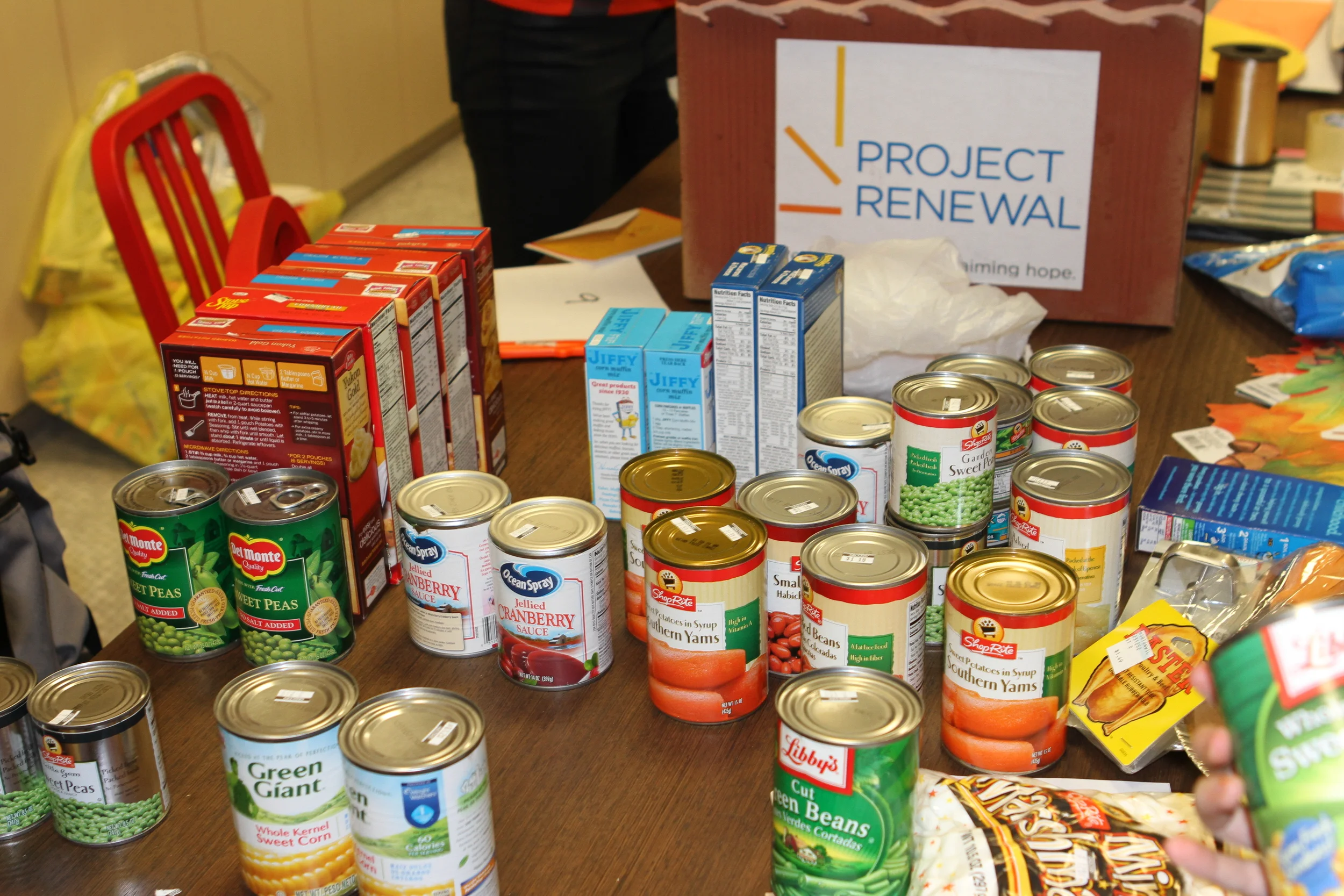
When Project Renewal first decided to present a gift basket to each of the families in our new En Casa program this Thanksgiving, it would have been easy enough to simply run to the supermarket to fill them up. Instead, we got in touch with our friends at Shelly’s Prime Meats, in Jersey, who were all too happy to provide turkeys. Next it was our neighbors, the Little Red School House near Bleecker Street, whose high school seniors agreed to each “adopt” one of the 11 families in our program, by providing the rest of the groceries in our gift baskets and a game or toy for each of their children.
It was they who suggested having their elementary students create custom holiday greeting cards for each family as well. This lead us to a interactive chat with them, beforehand, about who the people referred to as ‘the homeless’ really are.
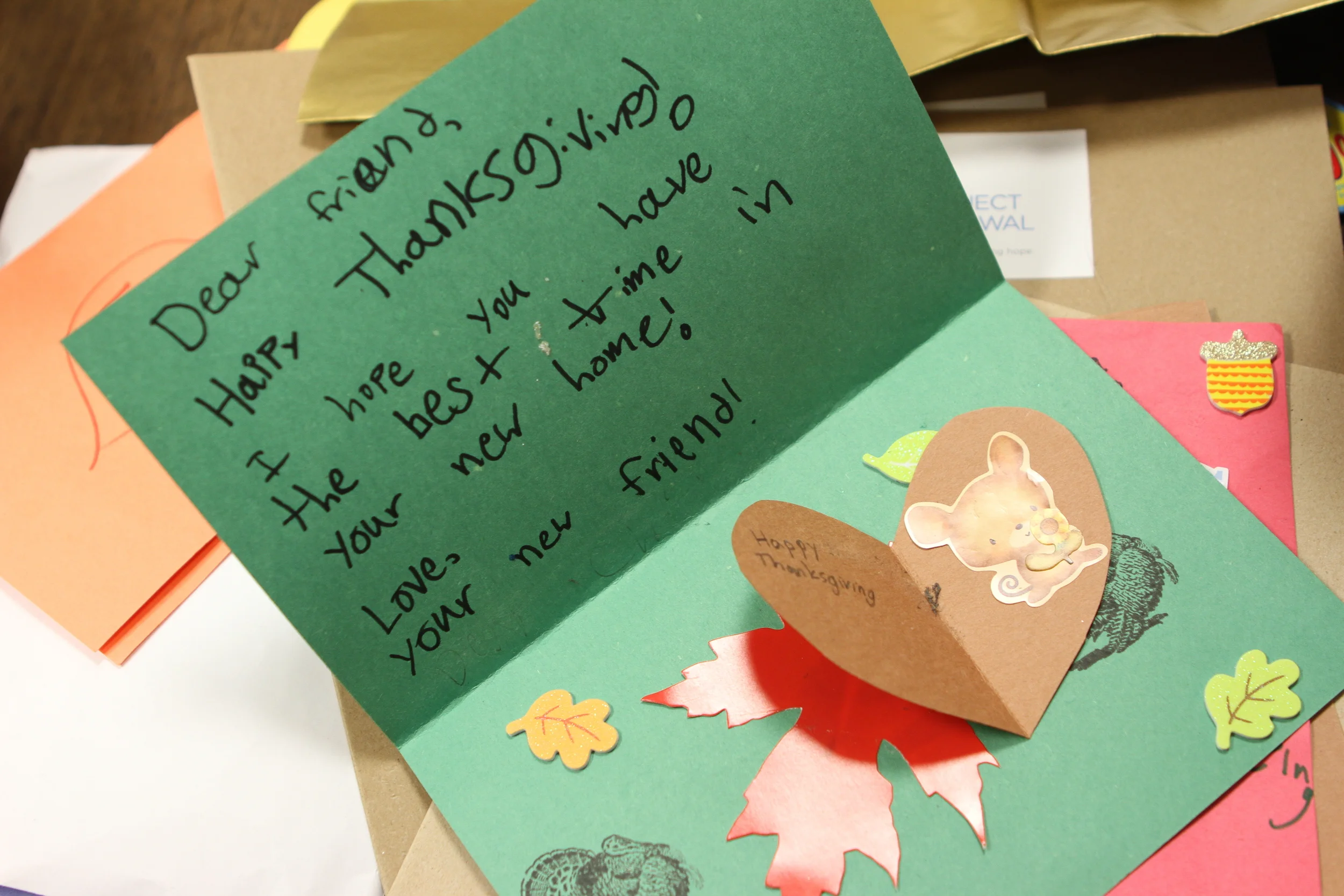
The En Casa Program was created last year in response to the growing need to provide the housing, counseling and wrap around support necessary to help keep the families of formerly addicted or alcoholic parents together while they go through the recovery process. But at Project Renewal, we see every one thing we do as an opportunity to do something else at the same time; like spurring community partnerships, for one thing. Or, even more important, evoking next-generation empathy toward a population too often marginalized.
And you thought it was just a gift basket!
As we approach the one year anniversary of Sandy Hook, Linda Rosenberg, president and CEO of the National Council for Behavioral Health, calls attention to the need for expanding access to mental health services America:
One in 5 Americans are, right now, living with a mental illness. Nearly half of them go without care, either because they can't afford it or, more often, because they don't know where to go or what to do. We must change that...
One year later, Congress is still debating two pieces of bi-partisan legislation that would go a long way toward ensuring more people get the mental health treatment they need.
The Excellence in Mental Health Act would improve the quality of mental health care and expand access to mental health treatment for hundreds of thousands of people served by community mental health centers.
The Mental Health First Aid Act would expand access to public education programs designed to help the teachers, first responders and others identify, understand and respond to signs of mental illnesses and substance use disorders. People are hungry for these programs. Since 2008, nearly 150,000 people have been trained in Mental Health First Aid – 40 percent of them in just the last year, since the Sandy Hook tragedy.
Geffner House celebrated National Recovery Month with the Addiction Professional's Day Community Celebration.
We had over 60 attendees both professionals, consumers and community members. Presenters included Jewish Board of Family and Children's Services, MSOWS, Addictions Institute, HAI, Lantern Organization, Emerald Water and Huron Health Care.
Thank you to everyone who joined us for National Addiction Professionals Day on September 20 to recognize their important work in the field of recovery and treatment. Coinciding with National Recovery Month. NAADAC held its first Addiction Professionals’ Day on June 11, 1992 (originally called National Alcoholism and Drug Abuse Counselors Day). It was established to commemorate the hard work that addiction services professionals do on a daily basis
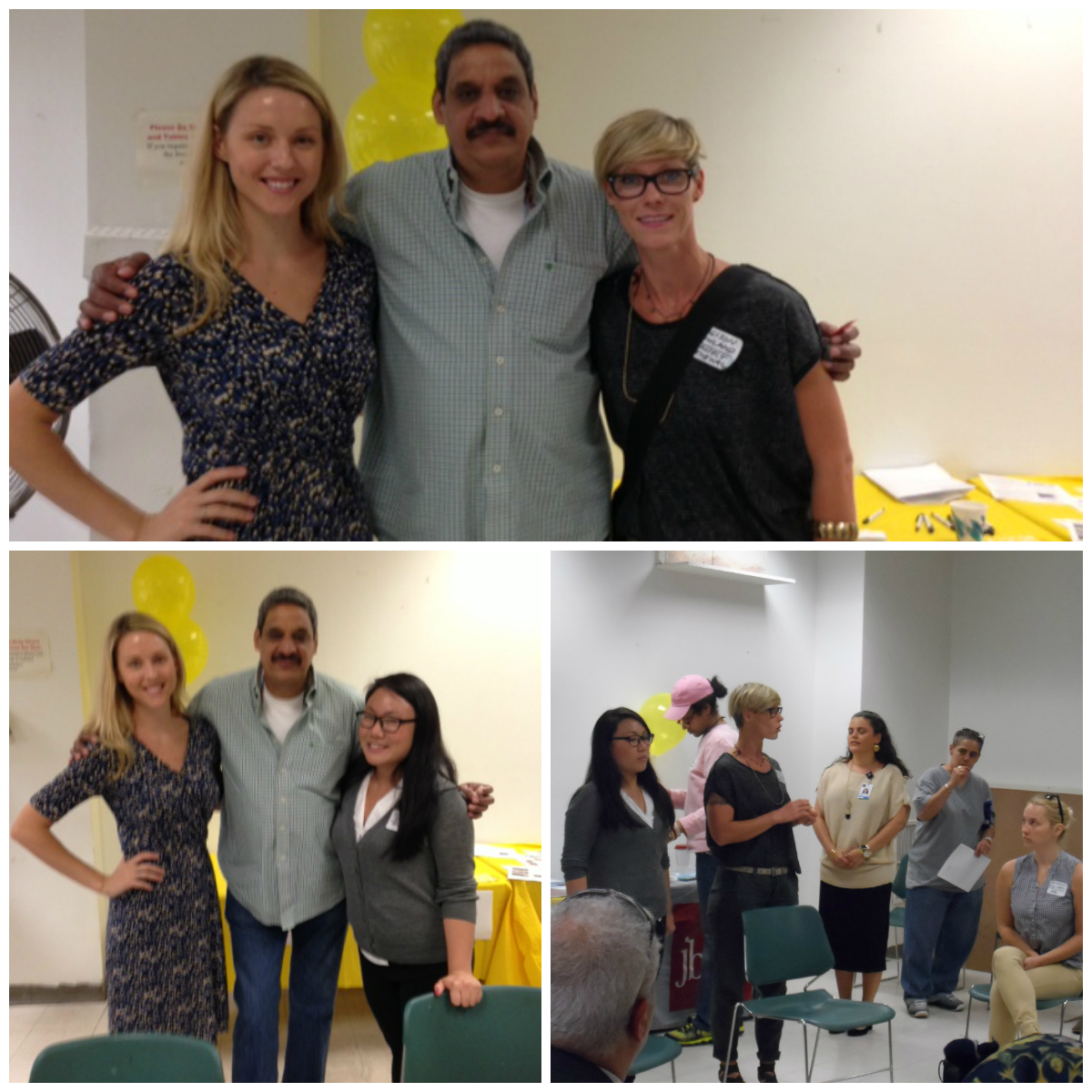

By: Lee Stringer
A bunch of years back, a long distance friend of mine from called me while in the throes of a depression she couldn't shake. An inexplicable malaise and despair had been dogging her for weeks. She couldn't drum up the stuff to even step outside her door. We first met in New Orleans a few years earlier, where she, I, and three of her friends spent the lion’s share of the day and evening together. And I suppose the impression she got from the extended, round robin conversations between us, was that I might be someone from whom to seek help out of the kind of fix in which she now found herself.
I demurred that I wasn't qualified as a shrink.
However, I did know one thing. I knew it as absolutely as a thing can be known, and it is this: the human spirit needs to give. It needs to be needed. It needs this as profoundly as the body needs air and water. I learned this the hard way; during the long months I was at Project Renewal’s 3rd Street Treatment Center in New York, agonizing my way back from over a decade of sucking on a crack pipe.
"When you get up tomorrow," I told her, "go out, whether you feel like it or not, find someone who needs something, and try to help them."
Despite her persistent dread, she managed to drag herself out of the house that next day and--her hobby being photography--took her camera with her. When she got back home, she was a few dollars poorer for having doled out spare change to many of the homeless people she had encountered on the street, but her camera was all the richer for the dozens of portraits she had taken of them.
The next time she called, she was doing better. She had mounted a show of her new images and was now rooting around for ways she could help the people in them. A few months later she called to announce she had founded a Newspaper for--and sold by--homeless people. Not too much later she emailed me with the news that she had ascended to the presidency of a national independent newspaper association, which she managed to wrestle back from the brink of extinction.
Last year she invited me to keynote at their annual conference.
She was all take charge, and get it done.
Her old self again.
The person I knew and loved.
But it’s not about the results. Not really. Not about solving problems. The takeaway of the whole episode is this: In giving, we access the better angels of our nature. We make for a better us. The more we each engage in such business, the fewer problems there will be needing solution in the first place.
This holiday season, midst the anxieties of shopping and shipping, and the hurry of parties and people, give yourself a break. Find respite by reaching from the inside out—a small step that I have seen can change everything.
Give. Then give again.
Get into the habit.
No one deserves it more than you.
Lee Stringer is a writer who lived, homeless and crack-addicted, on the streets of New York City from the early eighties until the mid-nineties. He is a former editor and columnist of Street News. His essays and articles have appeared in a variety of publications, including The Nation, The New York Times, and Newsday. He currently lives in Mamaroneck, New York. He is the author of Sleepaway School and Grand Central Winter. Stringer also took part in a discussion on writing with Kurt Vonnegut for a book entitled Like Shaking Hands With God. He is also a former client and member of the Board of Trustees of Project Renewal.
We met with Ethan Balgley, an intern for the past year with our mobile medical vans. this is part one of a two part series from that interview.

How did you come to Project Renewal?
As an AmeriCorps volunteer through the Avodah (the Jewish Service Corps) I wanted to get hands on front line work with clients and to be in a medical setting close to clinical work before going to medical school next year. Project Renewal was perfect for that.
The point of the AmeriCorps program is to develop leaders in urban poverty programs in the United States. I had focused on health disparities in urban poverty situations abroad so now I got to look at it in this country.
What is one thing you have learned this year?
Lack of housing and not actually a health problem at all because the lack of housing contributes to a host of problems. There is an idea in healthcare for the homeless of "housing as healthcare." This links urban policy at a more macro scale to micro level health problems that we see.
If you were telling a friend about what you do, how would you explain it?
I do outreach with homeless people at a non-profit called Project Renewal in their medical department where I work on mobile medical vans.
This is unique and exciting because it is an incredibly low barrier way to access care and the kind of care a lot of homeless people aren't going to get. Many people are familiar with the fact that they can walk into an emergency room and get care of a certain kind. Even though there is no barrier there in terms of insurance, often times people have to wait for hours and hours unless they are in danger of death.
At Project Renewal we go to the places where homeless people are--clinics in shelters (both our own shelters and others) as well as a mobile medical program that brings vans to where homeless people congregate such as soup kitchens and shelters without clinics inside. We don't require people to have health insurance, and we help them get signed up for Medicaid if they qualify.
We give them kind of medical care that they can't find anywhere else. There are a very limited number of places where homeless people can get primary care at all, there are community health centers, New York City hospitals, and private doctors. Many private doctors will not accept Medicaid, and they certainly won't accept uninsured patients. City hospitals and community health centers by and large have incredibly long wait times to get an appointment with a primary care doctor. To have a service where patients can walk up to the medical van the day of and come in and see a primary care doctor is amazing.

There are a few other organizations where a homeless person can do that but you can count them on one hand in a city the size of New York , so what we are doing is definitely unique and valuable.
Want to learn more about how Medicaid is going to help homeless New Yorkers AND save tax payer's money?
For the idea in brief, read below, or check out this report from the Center for Health Care Strategies and the Corporation for Supportive Housing.
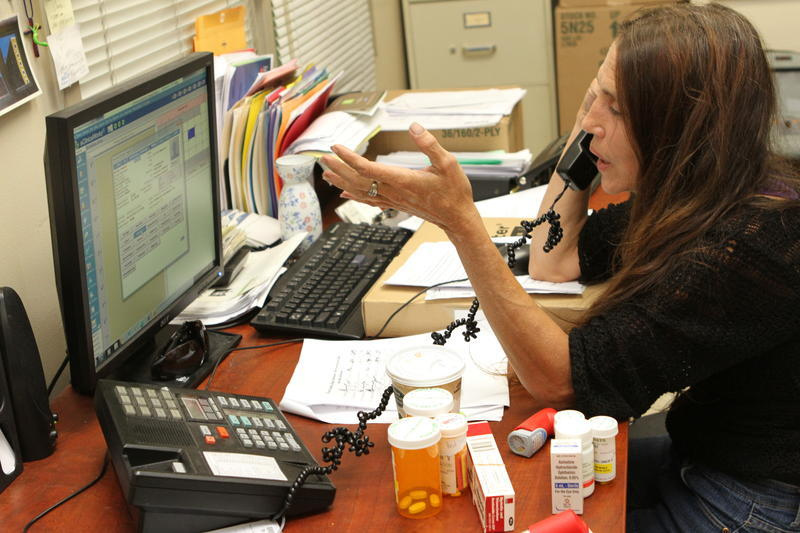
The Affordable Care Act redesigned the systems that deliver healthcare to the highest users of Medicaid—often homeless adults with chronic illnesses and serious mental illness that cause frequent emergency room visits.
But many of those men and women are unclear of how to access care now. For example, 41% of our shelter residents are eligible for Health Homes.
A Health Home is a network of caregivers that work in collaboration with one another to help men and women with chronic health conditions and serious mental illnesses.
This coordinated approach to healthcare is designed to improve health outcomes for the highest need patients and reduce costs for taxpayers.
We now have two staff members who work as Health Home Coordinators. By accessing a single network of caregivers, our Health Home Coordinators can refer homeless adults to every service they need – from an eye exam to mental health treatment.
Through participating in the Health Homes program, we’re making healthcare even more accessible for the homeless men and women who need it most.
This year's annual anniversary celebration of the Ft. Washington Men's Shelter had a special guest--the new NYC Department of Homeless Services Commissioner Michele Ovesey.
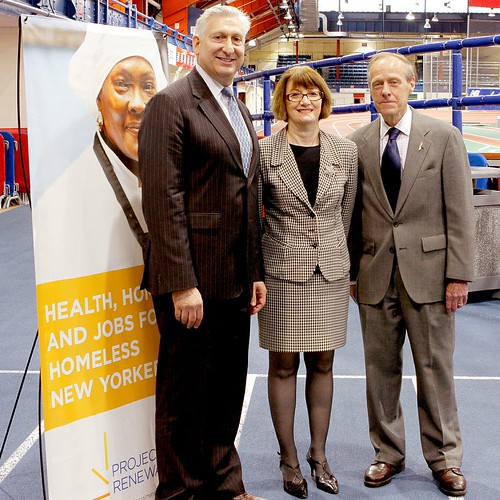
The New York City Department of Homeless Services (DHS) Commissioner Michele Ovesey (center) with Project Renewal President & CEO Mitchell Netburn (Left) and Dr. Norbert Sander, executive director of The Armory Foundation at The New Balance Track & Field Center.
Commissioner Ovesey commended the width breadth of Project Renewal programs. She said,
"I was amazed that Project Renewal was working on preventing homelessness and treating the underlying causes as early as 1967, a good 20 years before they were widely known."
Congrats staff and clients on 17 years!
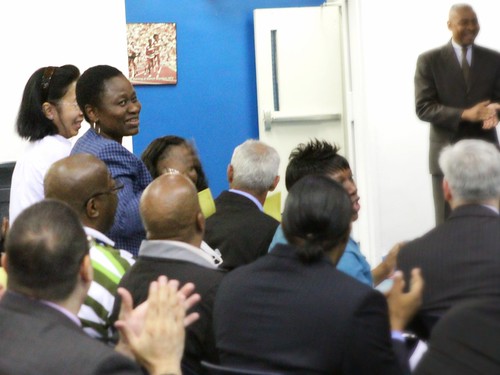
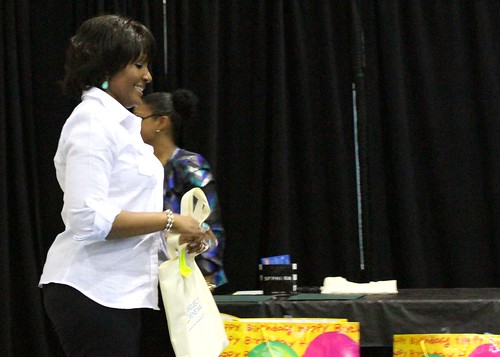
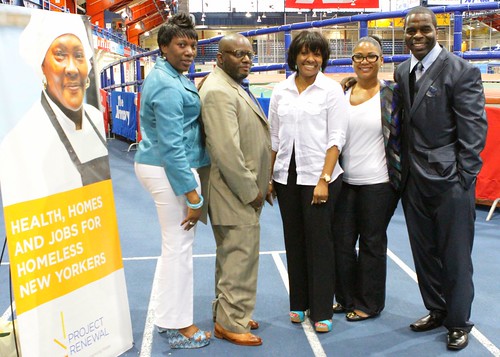
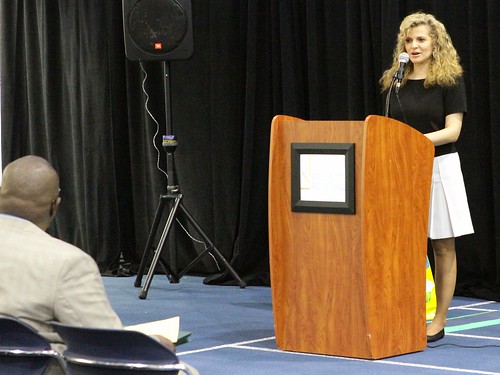
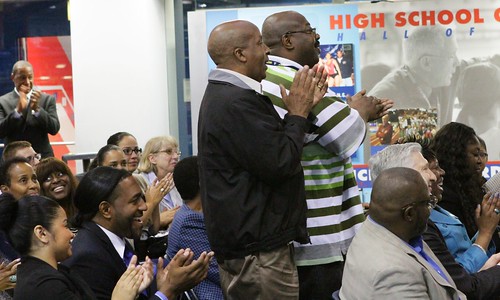
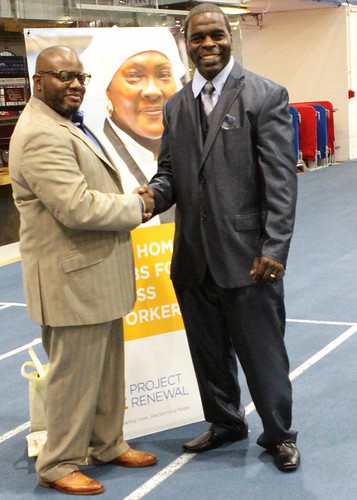
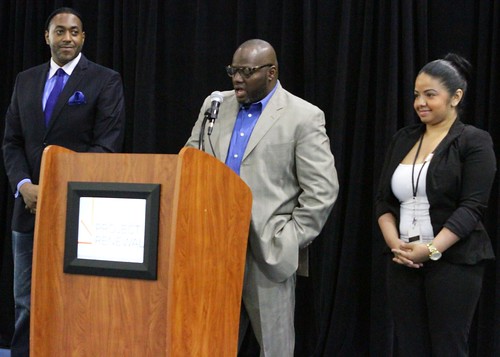
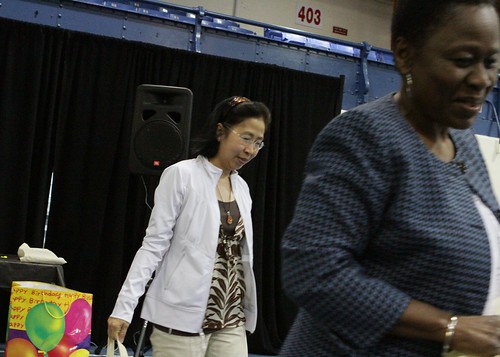
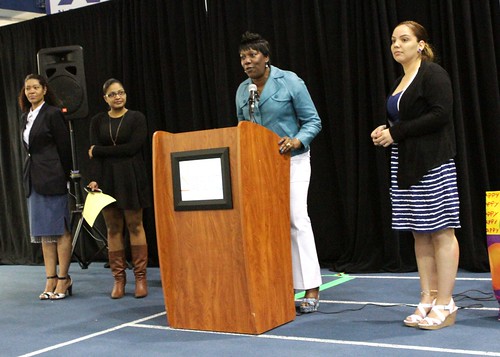
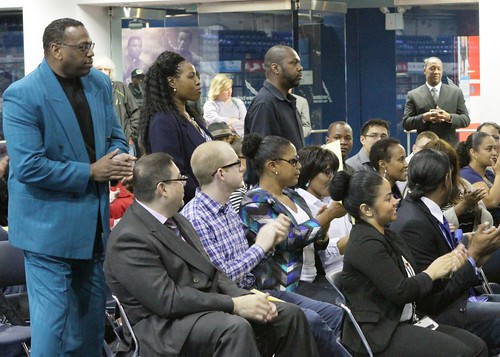
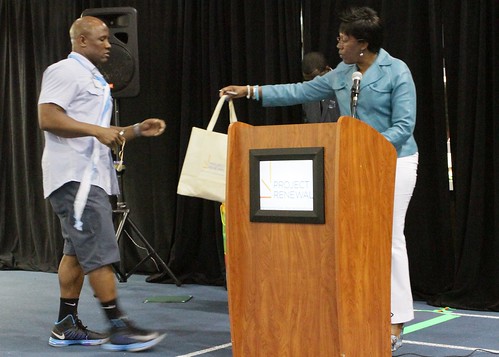
The nursing staff at Project Renewal has a lot to be proud of this year.
In the past 12 months Project Renewal has been:
Below are photos from the annual Nurse Appreciation Day celebrated this month. Please join us in honoring all their hard work!
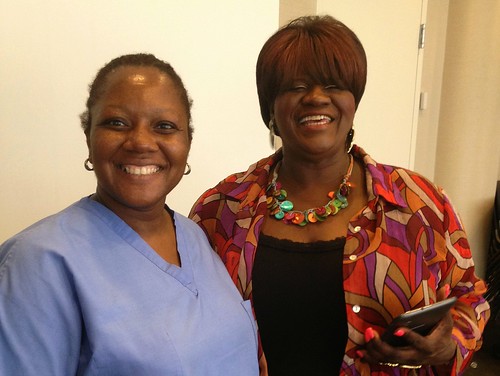
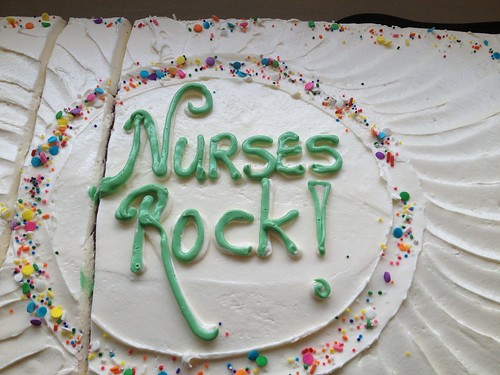
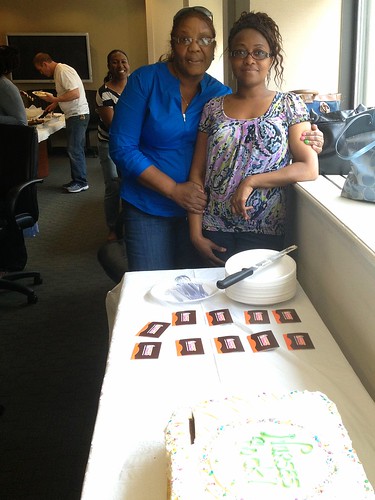
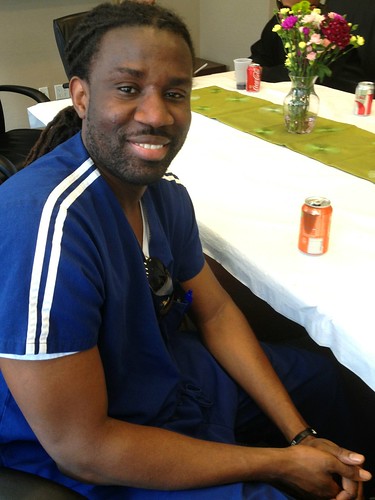
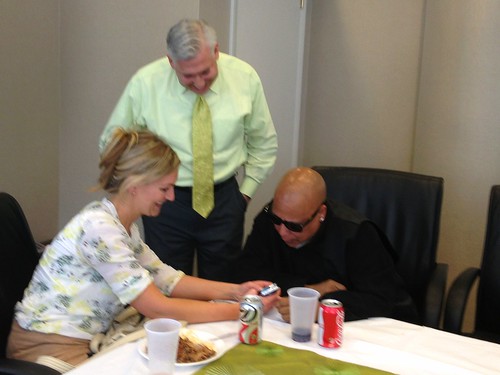
Over the past 30 years, the NYU Community Fund has awarded over 1,600 grants to local nonprofit organizations totaling more than $2.5M.
At an award ceremony earlier this month, New York University’s Office of Civic Engagement awarded more than $160,000 grants to 83 community-based non-profit organizations with money raised from hundreds of NYU employees, "each of whom believes in the important work being done by these organizations every day." said Bill Pfeiffer, director of the Office of Civic Engagement.
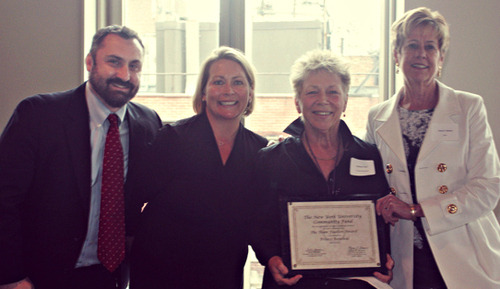
Medical Administrator Pat Troy holds the plaque awarded by NYU Community Fund.
Of those 83 organizations, including the United Way of New York City, Project Renewal received the Thom Fluellen Award to support our groundbreaking Mobile Medical Program:
Since 2001, one outstanding organization each year has received a distinctive $5,000 grant in memory of the former Community Fund staff director, Thom Fluellen, whose spirit and enthusiasm for this community was an inspiration to countless others. This year, the award went to Project Renewal.
Founded in 1967, Project Renewal empowers homeless men and women struggling with addiction and/or mental illness to rebuild their lives with renewed health, homes, and jobs. Project Renewal's comprehensive and innovative approach combines healthcare, addiction and mental health treatment, employment services, and housing to ensure clients remain in permanent homes and become productive members of their communities.
“The $5,000 Thom Fluellen Award will help support our groundbreaking mobile medical programs - MedVan, StreetSmart, LifeLine and CareVan - which connect chronically homeless New Yorkers with ongoing health care,” said Mitchell Netburn, president & CEO of Project Renewal. "The award is a wonderful endorsement of our mission to improve the health of homeless men and women with complex needs who face multiple barriers to accessing high quality health care."
“As of this year, the NYU Community Fund celebrates its 30th year of operation, proud to have awarded more than 1,600 grants totaling more than $2.5M to community groups since the program’s inception,” said Pfeiffer. “We look forward to many more years to come.”

How do we do it?
______________________________________________
From the Archives! Sprint 2012 -- Having a key means everything
Meet the tenants of Fletcher Residence
The west wing, Fletcher Residence, is home to 55 mentally-ill men and women in their own studio apartments. Patricia was one of the first tenants to move in: “I love living here. I prayed for a place to live by Christmas and lo and behold on December 20th I moved in!”
“They are thrilled,” said Program Manager Peter Bazeley of the new tenants. “We have 13 admitted since December 20th and interviews are going on right now. We have stacks of applications, about ten applications for every opening. Most tenants will come directly from shelters, including our own shelters, New Providence and Fort Washington.”
The men and women at Fletcher Residence receive long-term training to achieve lasting stability, work on sobriety issues if necessary, work on community integration skills, and daily living skills. Explains Peter, “Independent housing is the final goal so now is the time to start developing the skills necessary to live independently in the community. Tenants are encouraged to make friendships outside of the program and engage in ordinary community activities such as going to the library, the movies or shopping. We have no curfew; residents can pretty much come and go as they please. We have medication supervision and money management when needed. We have a nurse, a psychiatrist once a week and case managers who work directly with the residents.”
As tenants settle in they are introduced to each other and have community meetings to talk about the skills they will be working on, including a cooking workshop to be held in the tenants’ apartments.
Patricia is enjoying her apartment’s many amenities. “I have a state of the art kitchen, refrigerator, flat screen TV, and a very comfortable bed with a comforter and sheets. They provide you with everything! I have a microwave, a working stove, a walk-in closet and I have a beautiful bathroom.” But more than anything, she is grateful for something that anyone else might take for granted…“It’s such a blessing to own a key to my own home. Having a key means everything after you’ve been homeless.”
Many many thanks to all who contributed to make our 2013 Gala Benefit and Auction a great success! You helped us raise almost $800,000 to fund mission critical programs.
Check out our photos of the Gala Benefit and Silent Auction here
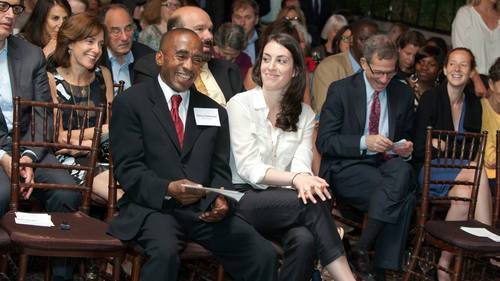

You might have seen Harry as a homeless man on the train years ago. Since childhood he has lived on the streets and spent almost 30 years in prison during his life. But now Harry is back! It is our honor to introduce you to Harry Dickerson, who gives us hope for New Yorkers still struggling to reclaim their lives.
Watch his story and be inspired!
The Primary Care Department received a 2013 Science and Service Award for Office-Based Opiod Treatment in recognition of its innovative use of buprenorphine as an accessible option for homeless patients. This model of care support SAMHSA’s priorities for addiction treatment including: recovery support services, integrated behavioral and primary health care services, hepatitis prevention and treatment services, practices that encourage patient choice in treatment planning, administrative practices that promote retention, access to care, and service/cost effectiveness and efficiency, and the use of electronic health records.
What does this mean? With the primary care clinic at 3rd Street co-located with 2 detox programs and The Recovery Center, patients withdrawing from heroin and other opioids can find a “one-stop shop” of integrated health care and recovery support. This means they are more likely to stay in care. In 2012 the average treatment was 361 days which is impressive. Medical Director Roslynnn Glicksman states: “As long as clients are in treatment, they are presumed to be free of illicit drug use and all that entails – overdose risk, illegal activity and risk of arrest, risk associated with intravenous drug use, and so on. So longer treatment is better. In that time, patients are also improving their housing situation and working on health and recovery issues. There is no limit to how long someone can be on buprenorphine maintenance. Addiction itself is a chronic condition with relapses likely and so treatment can and should continue.”
Congratulations to the Medical Department and all staff working with clients in this practice – another example of innovation in helping homeless men and women rebuild their lives!
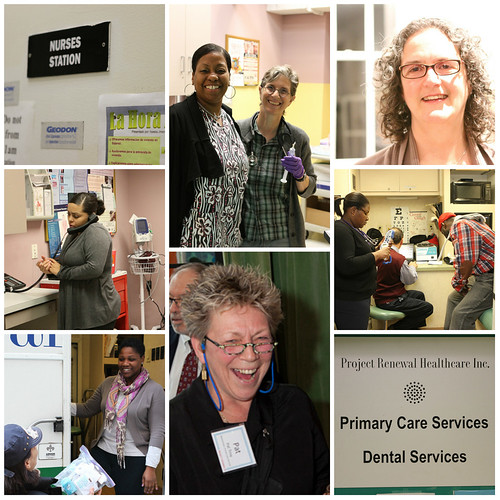

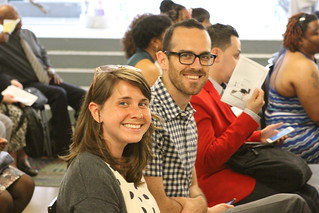





Celebrating the 70th graduating class of our Culinary Arts Training Program!
© Project Renewal
212.620.0340
200 Varick Street
New York, NY 10014